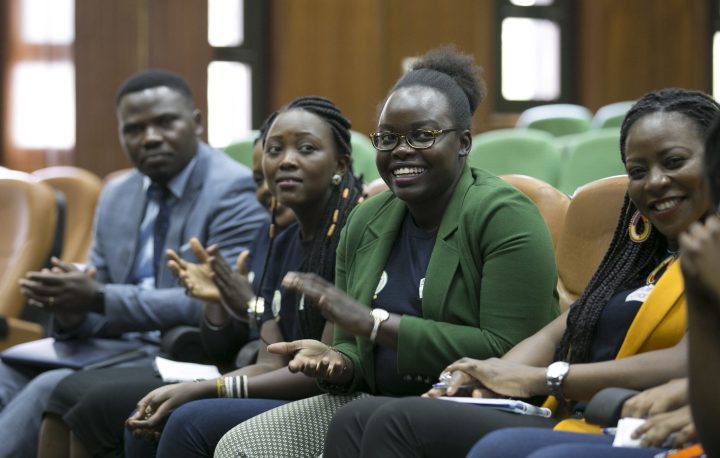ISS TODAY
Revised African Union policy could provide youth with active and effective peacebuilding roles

The African Union and its member states must move beyond tokenism to ensure meaningful youth participation.
Despite the African Union’s (AU) various youth inclusion initiatives, practical and meaningful youth participation in peace and security remains a challenge. Countries haven’t translated these initiatives into national policy, and generally have weak youth-centred approaches that amount to tokenism rather than real inclusion.
This week marks Africa’s third Post-Conflict Reconstruction and Development (PCRD) Awareness Week. The latest revision of the PCRD policy includes youth as one of two new pillars (the other is environmental security). But can the new policy, set to be launched in 2024, give young people an active role in peacebuilding?
Peacebuilding is currently at a crossroads, affected by several global changes, including Covid-19 and geopolitical wars. And while peacebuilding was previously centred on post-conflict activity, the new PCRD policy deals with the pre-conflict and during-conflict stages. This reflects a global paradigm shift, articulated by United Nations Secretary-General António Guterres’s New Agenda for Peace. The new agenda calls for a refocus on prevention and integration as the future of peacebuilding.
While including youth is not new to the PCRD’s activities, the policy focus and application must go beyond top-down engagement. To make a real impact, young people need to be empowered and centred in peacebuilding activities.
AU initiatives such as the Continental Framework for Youth, Peace and Security have taken a broader approach to youth inclusion by addressing issues like youth rights and access to essential services. By contrast, the revised PCRD policy focuses on four tangible objectives to increase young people’s role in peacebuilding: protection, prevention, cooperation and partnerships.
Read more in Daily Maverick: Unlocking the potential of SA’s youth through the power of partnerships
Education, skills focus
The policy recognises the importance of education to equip young Africans with the knowledge to address emerging challenges and contribute to stability on the continent. This includes tailored education programmes (both primary and tertiary) and mentorship initiatives. The policy should also emphasise the integration of peace education into school curricula from an early age.
Specific country targets for skills development could also be set by the policy, such as improving blue economy skills for the youth of coastal cities. Lessons could be taken from initiatives such as the Rwanda Youth in Agribusiness Forum, which has provided young people with farming and entrepreneurial skills, enabling them to contribute to economic growth and stability in their communities.
The policy also encourages youth entrepreneurship in post-conflict settings through support for business initiatives. Such initiatives can leverage technologies and digital platforms, creating new opportunities for youth-led startups. An example is Uganda’s Girls in ICT programme, which gives young women digital literacy and coding skills, enhances their employability and promotes gender equality in the tech industry.
Read more in Daily Maverick: Adolescent girls in eastern and southern Africa face increased adversity
To move beyond mere tokenism, young people also need to be integrated into negotiating teams and thematic committees, and included as witnesses and observers to peace agreements. Youth delegates could play a crucial role in building peace both within and outside the negotiation room.
In August, the AU Mediation and Dialogue Division engaged young people in high-level decision-making during the consultative meeting on setting up the WiseYouth Network. This was a useful process, but by taking lessons from the revised PCRD policy, WiseYouth can deepen the role of youth in mediation by increasing their influence and contributions.
Will and implementation
As with all AU policies, the effectiveness of the PCRD policy will hinge on whether it is domesticated and implemented at country level.
On 3 November, the AU’s Peace and Security Council (PSC) underscored the importance of collaboration in implementing the Continental Framework for Youth, Peace and Security. As 2024 approaches — the midpoint of the framework’s implementation — the PSC has set ambitious targets for member states: 25% youth-led National Action Plans by 2024 and 50% by 2029 at the regional level. So far, progress has been limited, with only a handful of countries developing youth, peace and security action plans.
An April 2023 roundtable to promote national youth action plans brought together countries that have already adopted the plans, like the Democratic Republic of the Congo and Nigeria. States where the plans are in progress also attended, including Cameroon, Tunisia, and Zimbabwe. Burundi, Kenya, Namibia, The Gambia and Uganda expressed strong interest in following suit.
To achieve meaningful youth participation in peacebuilding, African nations and the AU must prioritise implementing youth-centred policies and initiatives in line with the revised PCRD policy. DM
Emmaculate A Liaga, Researcher, Training for Peace, Institute for Security Studies (ISS) Addis Ababa.
First published by ISS Today.


















 Become an Insider
Become an Insider
Comments - Please login in order to comment.